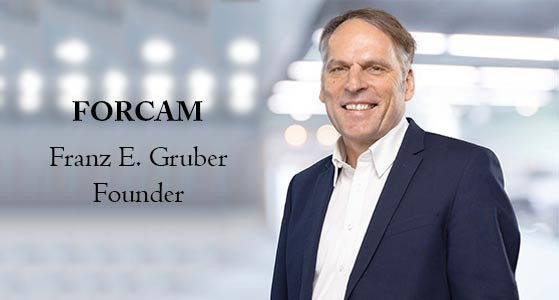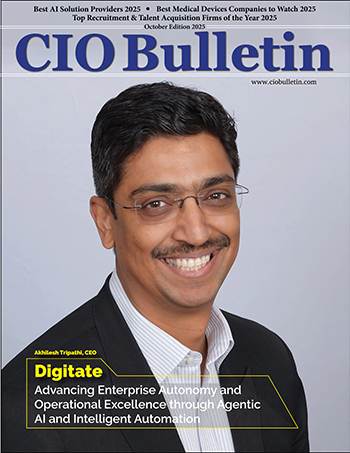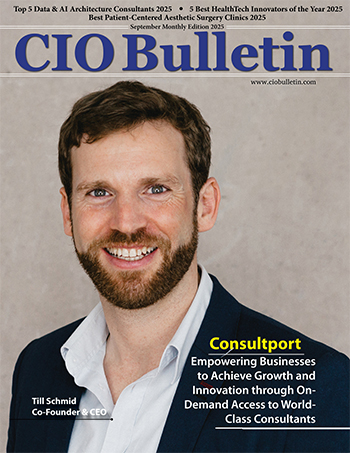30 Most Influential Companies of the year 2020 (Special Edition)
CIO Bulletin

In evolution has become a revolution: The industrial internet of things (IIoT). It refers to the extension and use of the internet of things (IoT) in manufacturing companies. Strategically, the IIoT enables enterprises to significantly improve their efficiency and competitiveness in all operations. Respective technology optimizes software-defined production and planning processes, integrating existing and new applications like AI, predictive maintenance, or robotics.
In the IIoT, a platform economy is establishing as we have seen it in the consumer business. As recently as 1998, only one of the ten most valuable companies in the world had a business model based on a platform solution, Microsoft. By 2018, this figure had risen to seven out of ten, led by Apple, Alphabet (Google), and Microsoft.
Now, platform technology conquers the industry. For manufacturing companies, the IIoT is about nothing less than their future viability. In the current situation of 2020, industry managers even have to face a double challenge: reducing costs in the short term and making a fresh start for competitiveness. The most urgent task is to protect liquidity sustainably.
Oliver Hoffmann, Co-CEO of Smart-Factory- Expert FORCAM: “Only those who work with the right strategic approach and with a cloud-based high-performance technology – only those will participate in the digital business processes of tomorrow.”
Factors for improvement
Digitization is not a goal itself. The goal is to secure future viability by making a company more competitive. “A digital transformation will fly only with two wings – a cultural and a technological one,” says Hoffmann’s colleague and Co-CEO Dr. Andrea Rösinger. “On a cultural level, managers and their factory teams should welcome the possibilities of manufacturing 4.0: With the right technology, they can use manywell-known and user-friendly tools; they can work easier, more efficient, and more self-responsible and finally contribute to more competitiveness and more secure jobs.”
FORCAM – a pioneer for IIoT
FORCAM is a pioneer for the IIoT. In 2001, the idea of the founder Franz E. Gruber and colleagues, all of them former SAP managers, was to close the gap between the top floor and the shop floor, i.e. to integrate precise smart data from the machine and factory level into the planning level (ERP - Enterprise Resource Planning). The first customer wanted to bring light into the darkness of production, so the task was to integrate three hundred heterogeneous machines.
FORCAM did the job very good, and that was the birth of their server-centric Edge Connectivity Engine for connecting and integrating heterogeneous machines. Because FORCAM is an advocate of lean management, the next milestone was to help a well-known automotive customer to achieve a productivity leap of twenty percent in the first year. Franz E. Gruber: “In 2011, we decided to start a radical new development. With the help of our anchor shareholder Dietmar Hopp, FORCAM was able to make a radical new start to build a solution that is ready for the cloud and thus ready for the IIoT of today.” FORCAM spent five years of developing a new open platform solution - an ongoing process until today - with the great help, support, and trust of customers.
FORCAM FORCE™
Today, FORCAM offers the flexible, open, and cloud-based IIoT platform solution FORCAM FORCE™. The solution supports manufacturing companies to participate in the digital supply chains and business models of the IIoT. FORCAM FORCE™ enables data-driven manufacturing: It creates a unified data model of production for real time analysis on shop floor and top floor, it includes turnkey important factory apps (MESA) and enables free composition and collaboration of existing and new systems through open web interfaces.
FORCAM technology is used by internationally active, large and medium-sized companies alike - including BorgWarner, Dynomax Aerospace, Howmet Aerospace (formerly Arconic), Kostal, Krones, Lockheed Martin, Richards Industrials, Schaeffler. According to current benchmarks, analysts from both the USA and Europe rate FORCAM as a technologically leading IIoT platform solution for digitization of production. FORCAM also offers an ecosystem of strong partners on a growing marketplace of industrial solutions and apps.
New Manufacturing Experience
The latest innovation of FORCAM is creating a new manufacturing experience: A connector for manufacturing purposes is integrated into the App-universe of Microsoft Power Automate. This is an ecosystem of around 400 market-famous apps, including Excel, Facebook, Outlook, Skype, Trello, Twitter, and many others. The goal of the ecosystem is to empower users to automate repetitive business processes and set up smart workflows for a variety of purposes.
The new FORCAM connector “FORCE Bridge” builds the bridge between the Microsoft App ecosystem and the production data of a manufacturing company. This enables companies to drive the digital transformation with Factory Work 4.0: By using many apps of Microsoft Power Automate, factory teams now can fulfill important tasks much more efficiently through digitally triggered workflows and alarms in real-time, shortening reaction times, and minimizing downtimes in the event of errors in the production.
FORCAM Academy
The FORCAM Academy is FORCAM’s training institution that guides the smart manufacturing journey of manufacturing companies based on the philosophies of Lean Manufacturing and Total Productive Maintenance (TPM). Trainers of the FORCAM Academy provide proficient know-how on successful digital transformation and the practical application of data-driven manufacturing technologies.
About the Founder
Franz E. Gruber is the Founder of FORCAM and today works for the company as the strategic advisor and chairman of the advisory board. The graduate industrial engineer founded FORCAM GmbH together with Reinhold Krattenmacher in 2001.
Dr. Andrea Rösinger is Co-CEO at FORCAM and responsible for Global Service & Support, Development, Finance, and Human Resources. The doctor of economics has more than 25 years of experience in management positions. As Head of Development for SAP ERP and the CLOUD Solution SAP Business ByDesign, Finance & HR at SAP SE, Dr. Andrea Rösinger was responsible for leading and managing global teams to implement the company’s strategic goals.
Oliver Hoffmann is Co-CEO at FORCAM, responsible for worldwide sales, marketing, partner business, and the digitalization of selected business processes. The studied economical informatics has over 25 years’ experience in the selling of consultation-intensive software solutions.
“The challenges are great. But if you find the right answers, you can look forward to great opportunities,” FORCAM Co-CEO, Oliver Hoffmann.
“Manufacturing companies will successfully enter the IIoT if they first open up their minds and then open up their business and production models for new digital strategies.” FORCAM Co-CEO, Dr. Andrea Rösinger

Insurance and capital markets







